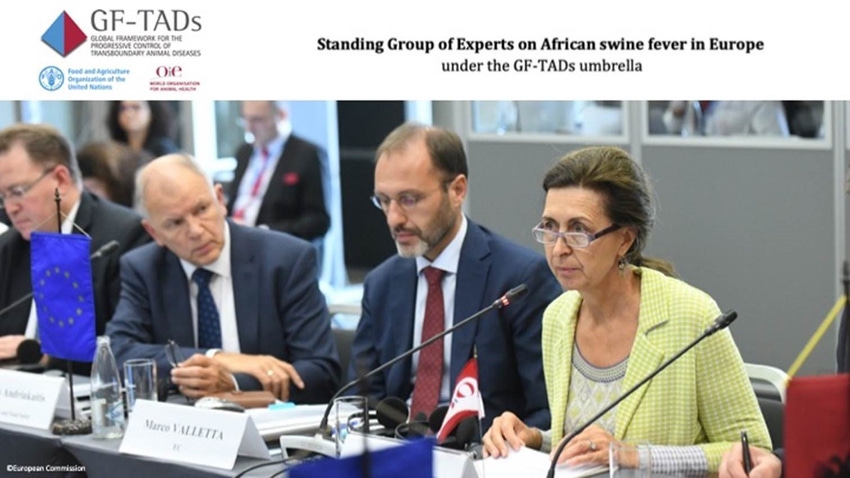Mobilization signals strong support for veterinary experts' work to try to stop spread of ASF in European region.
September 10, 2019

The 14th meeting of the Standing Group of Experts on African Swine Fever in Europe (SGE ASF14) opened Sept. 10 in Sofia, Bulgaria.
The impact of the current global African swine fever (ASF) crisis is a major concern to the swine industry, putting the livelihood of many smallholder farmers at stake and destabilizing the global market for pork products, according to an announcement from the World Organization for Animal Health (OIE), which organized the event with the U.N. Food & Agriculture Organization (FAO).
In the OIE Europe region, the ASF virus was introduced to Georgia in 2007, spread northward through Russia, Ukraine and Belarus, then reached the European Union territory — Lithuania — in January 2014 and quickly spread to Poland, Latvia and Estonia the same year before hitting Moldavia in 2016, OIE said. The most recent appearance of the disease started in 2017 with an active spread mainly southward, reaching the Czech Republic, Romania, Hungary and Bulgaria, the organization added. The virus was unexpectantly discovered in Belgium in 2018, then in Slovakia and finally in Serbia in August 2019.
OIE said this latest event in Serbia is of great concern for veterinary scientists and officials, as there is now a high risk that the virus will spread to the whole Balkan subregion. This led to the decision by the president of the "Global Framework for the Progressive Control of Transboundary Animal Diseases" (GF-TADs) for Europe to add a "VIP session" with ministers of the Balkans during the SGE ASF14 meeting.
SGE ASF14, which is part of the FAO/OIE GF-TADs initiative, gathers regional and international experts to exchange scientific information and experiences on ASF.
“The recent spread of the virus in southeast Europe constitutes a serious threat to the Balkan countries and territories and should trigger immediate action at national level to significantly raise the level of awareness on African swine fever and to address the situation,” European Commissioner for Health & Food Safety Vytenis Andriukaitis said. "Priority actions with neighboring countries should also be defined in a collaborative manner, preparedness being key for the control of this disease.”
Through countries’ declarations in OIE's World Animal Health Information System (WAHIS), it is estimated that ASF is currently present in more than 45 countries and territories around the world. During the last two weeks of August, OIE said 18 countries and territories notified new or ongoing ASF outbreaks in WAHIS, including 11 in Europe (Belgium, Bulgaria, Hungary, Latvia, Moldova, Poland, Romania, Russia, Serbia, Slovakia and Ukraine).
In Europe, experts have described two main patterns of ASF spread: In some parts of the region (mainly north and west), the disease is predominantly found in wild boar populations, sometimes with a total absence of outbreaks in domesticated pigs, whereas in the rest of the affected countries, its main progression occurs in the domesticated pig sector, with the majority in backyard farming, according to OIE.
The international agency said another lesson learned from past experience is the capacity of the virus to jump over long distances and appear in places where it was not expected, e.g., in the Czech Republic in June 2017, more than 500 km away from the closest affected zones in Poland and Ukraine, or in Belgium in August 2018, approximately 1,000 km from the nearest infected area in Poland.
“To stop the spread of such disease for which we do not have vaccine, coordination, collaboration and experience sharing between all stakeholders are essential at the national level but also at the regional and international levels,” OIE director general Dr. Monique Eloit explained. “The control is possible when everyone applies and respects the rules so that the disease does not become endemic, as demonstrated by the success of Czech Republic and Belgium.”
During the two-day meeting, the experts will exchange on the latest scientific evidence and field experiences about the disease, its epidemiology and how to better collect and share information to stop its spread.
Created in September 2014, this standing group has, over time, become a model for other regions, OIE said, noting that a similar group was created in Asia in April 2019 to face the rapid development of ASF in the Asia Pacific region, which is home to more than 60% of the global swine population.
Additionally, OIE said a new standing group of experts on ASF will be launched next week in the Americas with the objective to strengthen collaboration among countries in the region to prevent ASF entry into the Americas region, which is still free from ASF.
Source: OIE, which is solely responsible for the information provided and is wholly owned by the source. Informa Business Media and all its subsidiaries are not responsible for any of the content contained in this information asset.
You May Also Like



